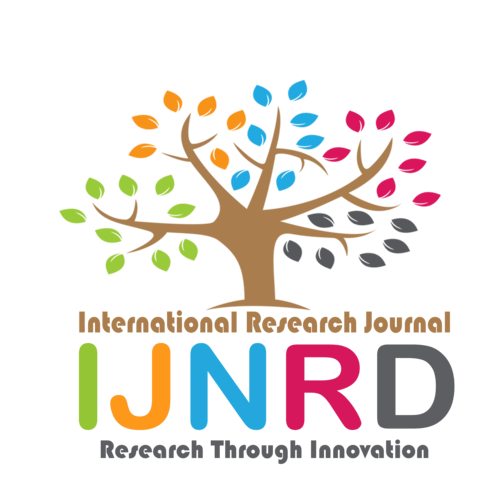|
|||||||||||||||

|
INTERNATIONAL JOURNAL OF NOVEL RESEARCH AND DEVELOPMENT International Peer Reviewed & Refereed Journals, Open Access Journal ISSN Approved Journal No: 2456-4184 | Impact factor: 8.76 | ESTD Year: 2016 Scholarly open access journals, Peer-reviewed, and Refereed Journals, Impact factor 8.76 (Calculate by google scholar and Semantic Scholar | AI-Powered Research Tool) , Multidisciplinary, Monthly, Indexing in all major database & Metadata, Citation Generator, Digital Object Identifier(DOI) |
||||||||||||||
Issue: April 2024
Volume 9 | Issue 4
Review Result and Publication of Paper within : 2-3 days
Click Here For more DetailsFor Authors
Forms / Download
Published Issue Details
Editorial Board
Other IMP Links
Facts & Figure
Impact Factor : 8.76
Issue per Year : 12
Volume Published : 9
Issue Published : 95
Article Submitted :
Article Published :
Total Authors :
Total Reviewer :
Total Countries :
Indexing Partner
Join RMS/Earn 300
Licence
This work is licensed under a Creative Commons Attribution-NonCommercial 4.0 International License







|
Published Paper Details
|
|
| Paper Title: | ALZEIMER'S DISEASE; A COMPLETE REVIEW |
| Authors Name: | MS.Pranjali Rajendra Kale , Dr. HEMANT.V.KAMBALE , Mr.SANTOSH.A.WAGHMARE |
| Download E-Certificate: | Download |
| Author Reg. ID: |
IJNRD_187975
|
| Published Paper Id: | IJNRD2303021 |
| Published In: | Volume 8 Issue 3, March-2023 |
| DOI: | |
| Abstract: | Alzheimer's disease (AD) is a neurodegenerative disease that usually starts slowly and progressively worsens. It is the cause of 60–70% of cases of dementia. The most common early symptom is difficulty in remembering recent events. As the disease advances, symptoms can include problems with language, disorientation (including easily getting lost), mood swings, loss of motivation, self-neglect, and behavioral issues. As a person's condition declines, they often withdraw from family and society. Gradually, bodily functions are lost, ultimately leading to death. Although the speed of progression can vary, the typical life expectancy following diagnosis is three to nine years. The disease is named after German psychiatrist and pathologist Alois Alzheimer, who first described it in 1906. Alzheimer's financial burden on society is large, with an estimated global annual cost of US$1 trillion. Alzheimer's disease is currently ranked as the seventh leading cause of death in the United States. No treatments stop or reverse its progression, though some may temporarily improve symptoms More than 6 million Americans, many of them age 65 and older, are estimated to have Alzheimer’s disease. That’s more individuals living with Alzheimer’s disease than the population of a large American city. Many more people experience Alzheimer's in their lives as family members and friends of those with the disease. The symptoms of Alzheimer’s disease — changes in thinking, remembering, reasoning, and behavior — are known as dementia. That’s why Alzheimer’s is sometimes referred to as “dementia.” Other diseases and conditions can also cause dementia, with Alzheimer’s being the most common cause of dementia in older adults. Alzheimer’s disease is not a normal part of aging. It’s the result of complex changes in the brain that start years before symptoms appear and lead to the loss of brain cells and their connections. The course of Alzheimer's is generally described in three stages, with a progressive pattern of cognitive and functional impairment. The three stages are described as early or mild, middle or moderate, and late or severe. The disease is known to target the hippocampus which is associated with memory, and this is responsible for the first symptoms of memory impairment. As the disease progresses so does the degree of memory impairment. |
| Keywords: | Alzeimer’s , diagnosis ,treatment ,genetics ,neurological |
| Cite Article: | "ALZEIMER'S DISEASE; A COMPLETE REVIEW", International Journal of Novel Research and Development (www.ijnrd.org), ISSN:2456-4184, Vol.8, Issue 3, page no.a234-a242, March-2023, Available :http://www.ijnrd.org/papers/IJNRD2303021.pdf |
| Downloads: | 000118749 |
| ISSN: |
2456-4184 | IMPACT FACTOR: 8.76 Calculated By Google Scholar| ESTD YEAR: 2016 An International Scholarly Open Access Journal, Peer-Reviewed, Refereed Journal Impact Factor 8.76 Calculate by Google Scholar and Semantic Scholar | AI-Powered Research Tool, Multidisciplinary, Monthly, Multilanguage Journal Indexing in All Major Database & Metadata, Citation Generator |
| Publication Details: |
Published Paper ID:IJNRD2303021 Registration ID: 187975 Published In: Volume 8 Issue 3, March-2023 DOI (Digital Object Identifier): Page No: a234-a242 Country: Kharadi, Pune, Maharashtra, India Research Area: Pharmacy Publisher : IJ Publication Published Paper URL : https://www.ijnrd.org/viewpaperforall?paper=IJNRD2303021 Published Paper PDF: https://www.ijnrd.org/papers/IJNRD2303021 |
| Share Article: | |
|
Click Here to Download This Article |
|
| Article Preview | |
|
|
|
Major Indexing from www.ijnrd.org
| Semantic Scholar | Microsaoft Academic | ORCID | Zenodo |
| Google Scholar | ResearcherID Thomson Reuters | Mendeley : reference manager | Academia.edu |
| arXiv.org : cornell university library | Research Gate | CiteSeerX | PUBLON |
| DRJI | SSRN | Scribd | DocStoc |
ISSN Details
 |
 |
ISSN: 2456-4184
Impact Factor: 8.76 and ISSN APPROVED
Journal Starting Year (ESTD) : 2016
DOI (A digital object identifier)
Conference
Open Access License Policy
Important Details
Social Media
| Copyright © 2024 - All Rights Reserved - IJNRD |












Facebook Twitter Instagram LinkedIn